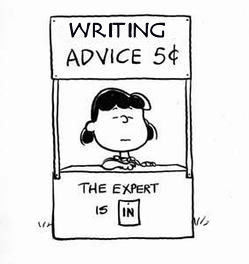As a pigheaded writer and a person who hates being told she’s wrong, criticism can be a hard thing for me to swallow. I’ll admit  that I’ve gotten better over the years at accepting advice and criticism, but there are some days when I can’t find it in myself to accept whatever you’re telling me. I found myself in one of those situations recently when a professor of mine tried to be helpful during a conference.
that I’ve gotten better over the years at accepting advice and criticism, but there are some days when I can’t find it in myself to accept whatever you’re telling me. I found myself in one of those situations recently when a professor of mine tried to be helpful during a conference.
So this conference I was in counts as our midterm. He counts the amount of pages we’ve written and tells us how we’ve improved and what still needs work. Normally, I love these types of meetings. I get praise, and I get help with my writing! But as I sat down in the world’s oldest, most uncomfortable, ugliest-orange chair, my professor didn’t have any words of wisdom. He told me to keep doing what I was doing.
I laughed right in his face.
The writing I’d been turning in for his class was all a joke! None of the assignments had ignited even the faintest amounts of creativity. My writing for this class was like breathing in a cow farm; it stunk. I’d been writing words hoping that when strung together they made sense. I wasn’t proud of anything I’d turned in! It was bland, unimaginative writing. I told him so.
He went on to tell me that I wasn’t allowed to be upset with how my writing turned out: “If you start down that path, you’ll never come back.”
And this is where I disagreed with him.
As a writer, reader, and want-to-be editor, my job is to recognize bad writing when I see it. Bad writing can be grammar mistakes left and right or Plain Jane sentences. It can be bad conflict, poorly plotted plots, or uninteresting settings. Or bad writing can simply exist as a piece with zero passion behind the words. But no matter what sort of bad writing you’re experiencing, if you have any sort of education you should be able to spot it.
The work that I turned in for class was all of those examples of bad writing. There was no passion behind the words. The plot was unfinished and not going anywhere. I had hoped that when I put the words together on the paper they would make sense.
My pieces were bad, and I turned them in because I was trying to complete the assignment he wanted. Just because I write something does not mean I have to like it.
I mean think of all the essays you bullshitted in high school. Did you actually care about any of the books or topics? Probably not. And if you did, there’s at least one that you struggled to write and you’re not proud of.
Everyone is entitled to dislike his or her work. I am entitled to dislike my work. (Please note that if you dislike all of your work, there maybe something bigger at play.) We all have those stories that we’ve written that, looking back on it, we’ve absolutely hated. We look back on those and we laugh! Think about your first draft compared to your last draft. That first draft is a joke! I have works that I despise, but I also have stories that I love. Works that I’ve slaved over. Stayed up late to make sure they’re perfect. The works of mine that I’ve reread and reread and rewritten and rewritten, those are the stories that are my favorites.
As writers, we need to understand ourselves in order to create our best work. If we have a grasp on who we are as individuals, we have a grasp on our best writing. Our best works come from knowing ourselves and the techniques that fit us best.
I can tell you that all of my stronger pieces are either going to be poetry or dark fiction. I’ve been writing long enough to know who am I as a writer and how I write. I can tell you that my weaker pieces are going to be nonfiction or the bubbly, happy-go-lucky kind of stories. I know myself. And I know how I write.
My professor was wrong in saying that I can’t dislike my own work. In order to grow as writers, we have to see what’s bad about our pieces and what’s amazing.
If you’re struggling to see your writing as marvelous here are some hints: you’ll know your best writing because it’ll make you think. It’ll be the story that keeps you up at night, crawling into your dreams and pulling you out of them. It’ll be worth sharing because even when you’re tired and sick of the world, you’ll turn (maybe a little begrudgingly) to your computer or notebooks, and write your exhaustion into your characters, into your world. It’ll hit you in the face a little but you’ll welcome that pain.
Please, please, notice when you’re not writing your best. It’ll help you grow and develop stronger pieces of writing! Don’t listen to my professor; I’m calling him Mr. Clueless from now on.
Mackenzie Trowbridge, Assistant Editor

